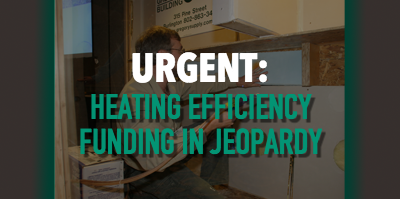You may have seen the news that the Vermont Senate is scrambling to plug a hole in the budget – and we’ve learned there are plans to raid funding for heating efficiency to do that.
A vote on these cuts is expected on the Senate floor FRIDAY.
Please, take one minute to call your senators and tell them you oppose using efficiency funds to close the budget gap. Leave a message with the Sergeant-at-Arms: 802-828-2228 or 800-322-5616.
For more background, see the joint letter submitted by VPIRG and fellow energy efficiency advocates to senators opposing cuts to efficiency funding.
April 30, 2015
Senator Jane Kitchel
Senator Claire Ayer
State House
Montpelier, VT 05602
RE: Low-Income Weatherization – RGGI Switch
We ask you to reject the administration’s last-minute proposal to shift $2 million from RGGI energy efficiency funds to backfill a $2 million reduction in Gross Receipts Tax funds currently budgeted to pay for low-income Weatherization.
Technically, the proposal from the administration to “backfill” Low Income Weatherization funding with RGGI funding after moving $2 million from the Weatherization Trust Fund to the General Fund is net neutral for Low Income Weatherization.
However, it is a significant policy change. The Gross Receipts Tax funds are deposited directly into the Weatherization Trust Fund. The Weatherization Trust Fund is the base funding for the Low Income Weatherization Program.
See 33 VSA Chapter 25: http://legislature.vermont.gov/statutes/fullchapter/33/025
The Gross Receipts Tax on non-transportation fuels (0.5%) was created specifically to fund this program. The change proposed by the administration is a policy change, in that it would use the Gross Receipts Tax for General Fund purposes.
Further, contrary to the Administration’s contention, cutting $2 million in RGGI funds will significantly reduce energy efficiency improvements for very low-income Vermonters and would result in additional demand on LIHEAP. It clearly hurts both middle AND low-income Vermonters.
$1.1 million in RGGI funds go to the Vermont Fuel Efficiency Partnership, which makes energy efficiency improvements on an average of 400-500 units of affordable multi-family rental housing a year. A $2 million cut to RGGI eliminates these funds.
If these funds are cut, some owners are likely to switch from central to individual metering, shifting heating costs onto individual low-income residents and making them eligible for LIHEAP benefits, at greater cost to the state.
These funds are a critical source for the development and redevelopment of the state’s affordable housing portfolio, half of whose residents have average annual incomes of $17,000. So far VFEP has assisted 3,000 out of 14,000 homes in the portfolio, leaving us a long way to go.
In closing, please reject the Administration’s proposal to make significant changes to long-established state policy at the last minute.
Thanks for your consideration,
Amy Shollenberger, Low-Income Weatherization Assistance Providers
Erhard Mahnke, Vermont Affordable Housing Coalition
Ben Walsh, VPIRG
Dan Barlow, Vermont Businesses for Social Responsibility
Lauren Hierl, Vermont Conservation Voters
Karen Lafayette, Vermont Low-Income Advocacy Council
Johanna Miller, Vermont Natural Resources Council

